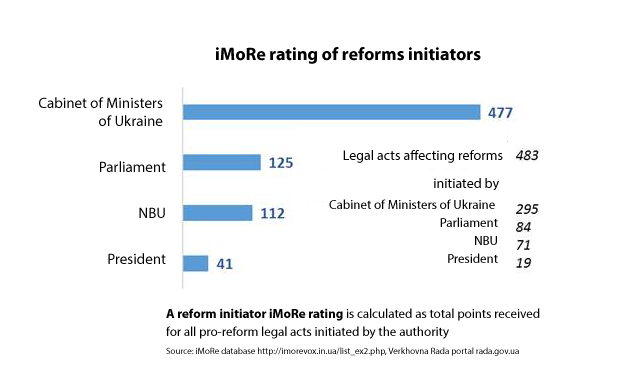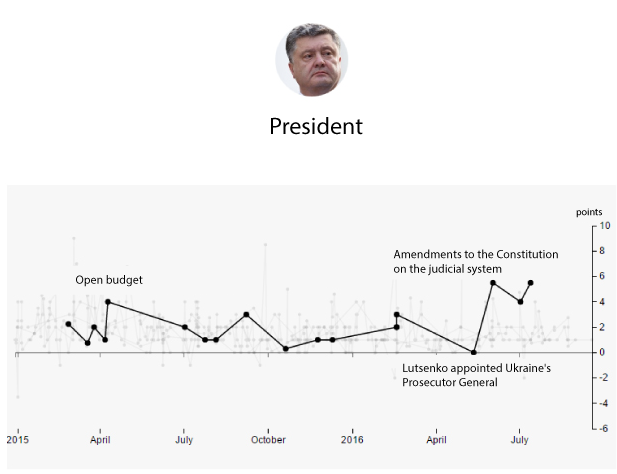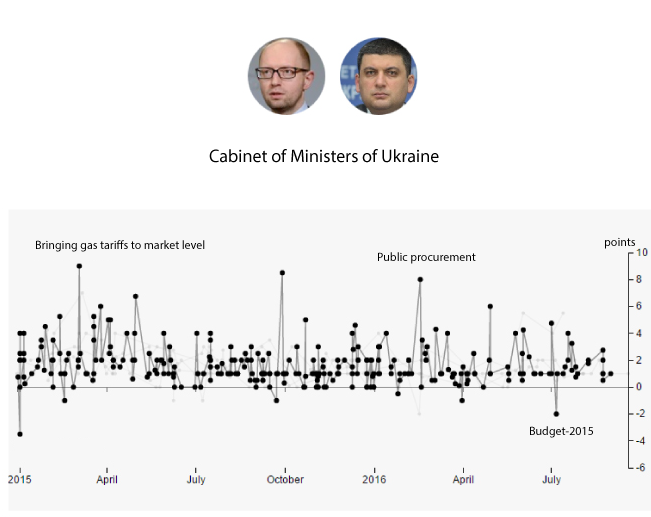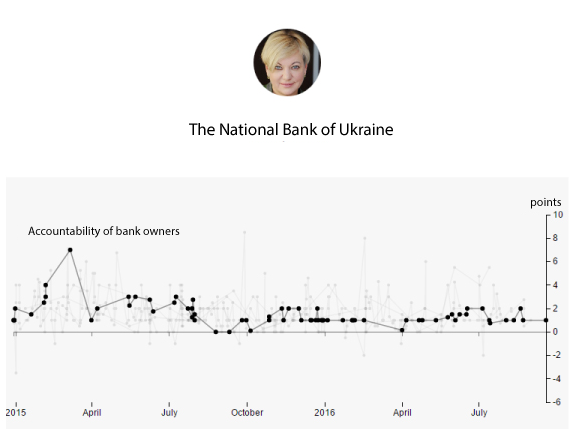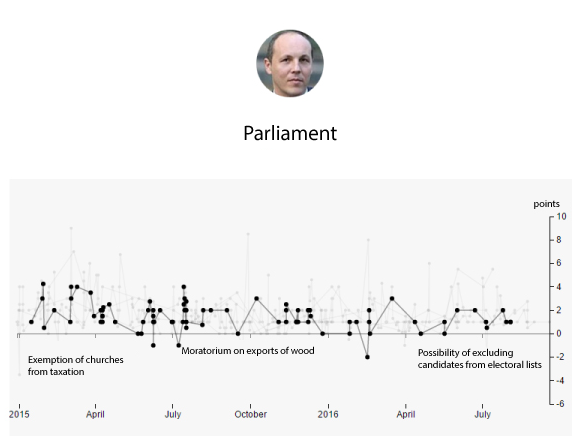Since the Revolution of Dignity, the President’s Office, the National Bank of Ukraine, the Parliament, and the various administrative bodies have begun a wide-ranging program of reform. Which governmental actions have proven to be good for Ukraine’s economy, and which have taken Ukraine in the wrong direction? Tetyana Tyshchuk and Oleksiy Hrybanovsky closely studied Reform Index in order to find out which government agencies are true to their word.
Since early 2015, Reform Index has been closely tracking nearly 500 pro-reform legal actions focused on governance, public finance, the monetary system, the business environment, and energy. The effectiveness of reform in each of the five areas has been assessed on a scale of -5 to +5 points.
According to the Reform Index rating, ten specific reforms stand above the rest in terms of their ability to positively affect Ukraine’s economy. First, natural gas tariffs for consumers and producers, as well as the price for the gas produced by Ukrgazvydobuvannya, were brought up to the market level. Second, the Rada adopted a series of measures intended to provide transparency in the public procurement process. Third, bank owners are now subjected to criminal responsibility for leading banks into bankruptcy . Fourth, new legislation was passed regarding the natural gas market. Fifth, the law on joint stock companies was amended. Sixth, the judicial system has been strengthened through both constitutional amendments and regulatory changes regarding courts and judges. Seventh, the Ministry of Infrastructure’s public services companies have disclosed their procurement records to the public. Eighth, the state-owned enterprise Ukrekoresursy was dismantled.
While the government has undertaken many positive reforms, there have also been decisions made that send Ukraine in the wrong direction. Nine laws and regulations earned a negative score on the Reform Index rating scale. Among them are the 2015 State Budget, the expansion of state funding for higher education, and a new law that authorizes political parties to arbitrarily exclude candidates from the party lists after the election .
Any governmental action, reform-minded in nature or not, must necessarily be initiated by one of the government’s main bodies. It is interesting to determine which government authority has initiated most of the positive reforms in economic policy. For the purposes of our study, we compared the Cabinet of Ministers, the NBU, the President, and other authorities.
It is important to emphasize that the NBU cannot unilaterally initiate legislation, but it would hardly be possible for any draft law on banking to be formed without input from the NBU’s leadership. Thus, we considered the NBU to be the initiator of all draft laws governing the banking sector, although they were actually submitted to the Rada by other authorities.
Although the president launched a small number of pro-reform initiatives (19), according to experts they were quite far-reaching and effective. They include constitutional amendments regarding the judicial system (+5.5 points), a new law entitled On the Judicial System and Status of Judges (+5.5 points), a measure that allows private enforcement of court decisions (+4.0 points), and a public database covering the national budget (+4.0 points). The President’s Reform Index rating is +41.
The government proved to be the most active reformer – the Cabinet of Ministers initiated 295 decisions (over 60% of all reforms) that have been crucial to driving reform forward. Reform Index rating of the government is +477 points. The highest-rated reforms were: the decision to bring natural gas tariffs up to the market level (+9.0 and +6.0 points), the new legislation on government and public procurement (+8.5 and +8.0 points), the new law on the natural gas market (+6.75 points), the legislative amendments regarding joint stock companies (+6.0 points), the public disclosure of the procurement by the enterprises controlled by the Ministry of Infrastructure (+5.25 points), the dismantling of Ukrekoresursy (+5.25 points), the new law On Deregulation (+5.0 points), the launch of online judicial services (+5.0 points), and the public disclosure of more than 300 databases (+5.0 points). The following actions earned a negative rating on Reform Index scale: the 2015 State Budget (-3.0 points), the expansion of state funding for higher education (-2.0 points), the delay in the decision to raise gas prices for consumers and providers in March 2016 (-1.0 point), the State Fiscal Service’s new initiative to introduce the benchmarks for customs valuation of imported goods (-1.0 point), and the limits emplaced on salaries of top state employees in 2015 (-1.0 point). The government’s rating could be higher if the parliament were quicker in passing the laws. According to VoxUkraine, on average, it takes 116 days for a draft law to be signed by the president. In the worst case, some worthy initiatives wait for 400-500 days before moving to the next stage.
The NBU has initiated 71 reforms to generate an overall Reform Index rating of +112 points. Most decisions (66) affect the banking system, currency regulation, and monetary policy. The most significant reforms by the NBU have been: an increased responsibility for banks’ owners (+7.0 points), the market-style liberalization of government securities (+4.0 points), the cessation of foreign exchange auctions (+3.0 points), the disclosure of banks’ affiliated persons (+3.0 points), the expansion of disclosure requirements for bank owners (+3.0 points), and the strengthening of NBU’s independence from undue influence from other government bodies (+3.0 points).
The Verkhovna Rada’s deputies have initiated the adoption of 84 reforms (17& of the total) to achieve an Reform Index rating of +125 points. The most significant reforms adopted by the Rada have been: amendments to the law On Joint Stock Companies (+4.25 points), disclosure of public spending (+4.0 points), a simplification of the bureaucratic process regarding land development (+4.0 points), and the opening of public registers (+4.0 points). However, not all of the Rada’s initiatives were positive. For example, there was: the legislation permitting political parties to exclude certain candidates from the party lists after the election has taken place (-2.0 points), the exemption of religious organizations from taxation (-1.0 point), and a moratorium on the export of wood (-1.0 point). According to the VoxUkraine rating of pro-reform parties, Narodny Front, PPB, Radical Party, and Samopomich were the most active in supporting pro-reform laws. The Opposition Bloc deputies rarely voted in favor of reforms. Volya Narodu and Vidrodzhennya have not contributed much to the reform process.
By Tetyana Tyshchuk, VoxUkraine Reform Index editor and Oleksiy Hrybanovsky
The authors are thankful to Oleksandra Betliy and Olha Mateva for their help in gathering information for the article
Attention
The authors do not work for, consult to, own shares in or receive funding from any company or organization that would benefit from this article, and have no relevant affiliations
